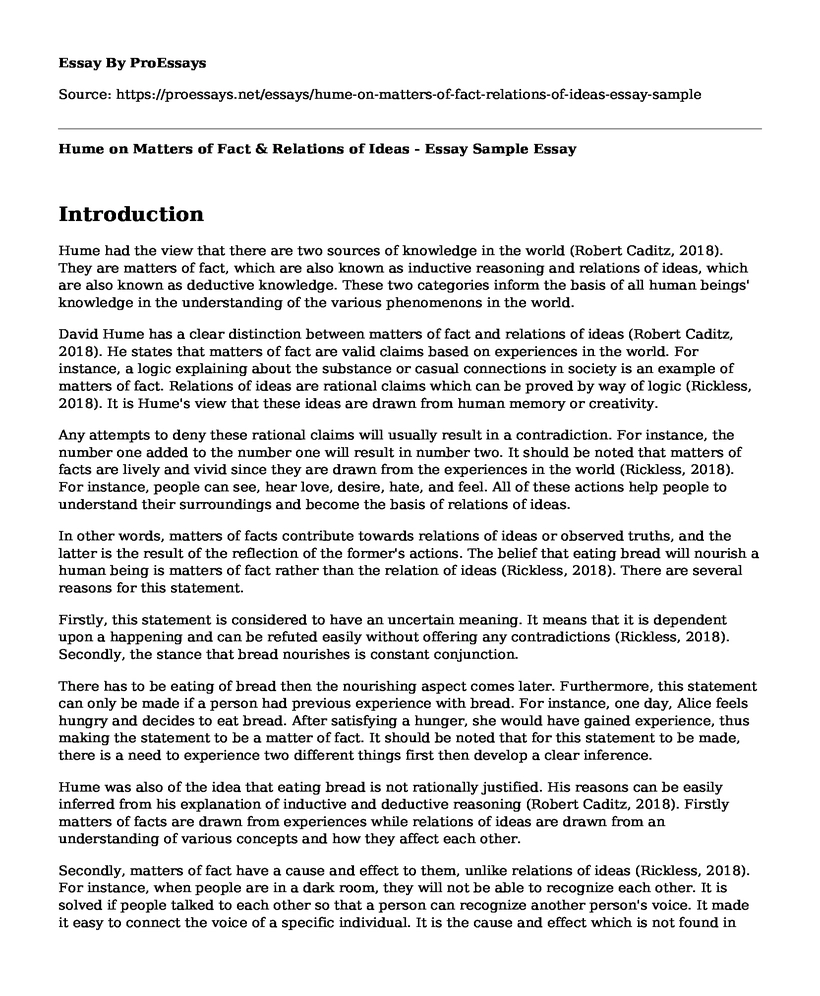Introduction
Hume had the view that there are two sources of knowledge in the world (Robert Caditz, 2018). They are matters of fact, which are also known as inductive reasoning and relations of ideas, which are also known as deductive knowledge. These two categories inform the basis of all human beings' knowledge in the understanding of the various phenomenons in the world.
David Hume has a clear distinction between matters of fact and relations of ideas (Robert Caditz, 2018). He states that matters of fact are valid claims based on experiences in the world. For instance, a logic explaining about the substance or casual connections in society is an example of matters of fact. Relations of ideas are rational claims which can be proved by way of logic (Rickless, 2018). It is Hume's view that these ideas are drawn from human memory or creativity.
Any attempts to deny these rational claims will usually result in a contradiction. For instance, the number one added to the number one will result in number two. It should be noted that matters of facts are lively and vivid since they are drawn from the experiences in the world (Rickless, 2018). For instance, people can see, hear love, desire, hate, and feel. All of these actions help people to understand their surroundings and become the basis of relations of ideas.
In other words, matters of facts contribute towards relations of ideas or observed truths, and the latter is the result of the reflection of the former's actions. The belief that eating bread will nourish a human being is matters of fact rather than the relation of ideas (Rickless, 2018). There are several reasons for this statement.
Firstly, this statement is considered to have an uncertain meaning. It means that it is dependent upon a happening and can be refuted easily without offering any contradictions (Rickless, 2018). Secondly, the stance that bread nourishes is constant conjunction.
There has to be eating of bread then the nourishing aspect comes later. Furthermore, this statement can only be made if a person had previous experience with bread. For instance, one day, Alice feels hungry and decides to eat bread. After satisfying a hunger, she would have gained experience, thus making the statement to be a matter of fact. It should be noted that for this statement to be made, there is a need to experience two different things first then develop a clear inference.
Hume was also of the idea that eating bread is not rationally justified. His reasons can be easily inferred from his explanation of inductive and deductive reasoning (Robert Caditz, 2018). Firstly matters of facts are drawn from experiences while relations of ideas are drawn from an understanding of various concepts and how they affect each other.
Secondly, matters of fact have a cause and effect to them, unlike relations of ideas (Rickless, 2018). For instance, when people are in a dark room, they will not be able to recognize each other. It is solved if people talked to each other so that a person can recognize another person's voice. It made it easy to connect the voice of a specific individual. It is the cause and effect which is not found in the relation of ideas.
Hume believes that bread is indeed nourishing (Rickless, 2018). There are various reasons for this statement. Firstly, Hume observes that there is a constant conjunction of things. For instance, when a person is hungry, they will take the bread and not think twice about whether it is poisonous or not. The reason is that in the past, when the person smelt, tasted, and ate something that looked like a loaf of bread, they felt some sense of nourishment. Therefore it is Hume's view that bread and nourishment have eternally continuously been conjoined, and when he sees them, he expects nutriment.
References
Rickless, S. (2018). Hume's distinction between impressions and ideas. European Journal Of Philosophy, 26(4), 1222-1237. https://doi.org/10.1111/ejop.12347
Robert Caditz, M. (2018). Exploring Hume’s Distinction between Relations of Ideas and Matters of Fact: The Devil Is in the…. Medium. Retrieved 13 May 2020, from https://medium.com/@MichaelRobertCaditz/exploring-humes-distinction-between-relations-of-ideas-and-matters-of-fact-the-devil-is-in-the-5e975624f2a6.
Cite this page
Hume on Matters of Fact & Relations of Ideas - Essay Sample. (2023, Aug 01). Retrieved from https://proessays.net/essays/hume-on-matters-of-fact-relations-of-ideas-essay-sample
If you are the original author of this essay and no longer wish to have it published on the ProEssays website, please click below to request its removal:
- Personal Ethics and Decision Making - Essay Sample
- Universalizing Process of Identity Essay Example
- Golden Mean - Essay Sample
- Ethical Values in Research Methods
- Essay Example on Managers: Embracing Ethics for Long-Term Success
- Paper Example on Plato's Search for Justice: Fear of Punishment or Doing What's Right?
- Reimagining Aladdin: Cultural Depictions, Character Transformations, and the American Dream in Animation - Free Essay







